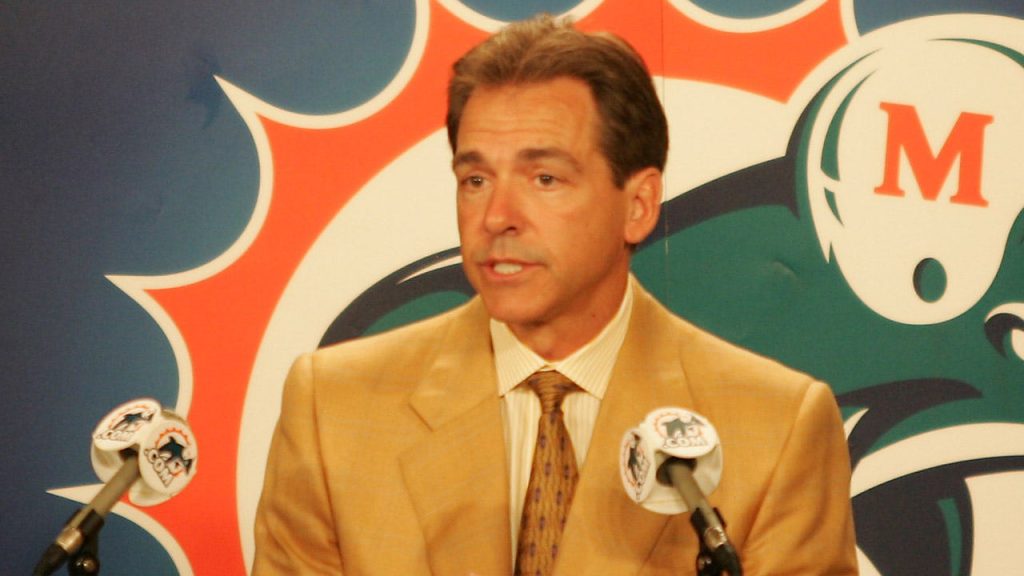Nick Saban’s legacy as a college football coach is virtually untouchable. With seven national championships to his name – six earned during a dominant reign at Alabama and one secured during his tenure at LSU – he stands as a giant in the sport. His 292 career wins mark a testament to his strategic brilliance, unwavering dedication, and ability to cultivate winning cultures wherever he lands. He retired from coaching in 2023, leaving on his own terms after an era of unprecedented success with the Crimson Tide. Yet, even amid such a celebrated career, Saban admits to a singular, significant regret: his two-year foray into the NFL with the Miami Dolphins. This decision, he acknowledges, represents a professional misstep, a deviation from the path that ultimately led him to his greatest triumphs.
Saban’s recent appearance on “The Pivot” podcast provided a candid glimpse into his reflections on this pivotal career moment. In conversation with LSU alumnus Ryan Clark, former Dolphins linebacker Channing Crowder, and ex-NFL star running back Fred Taylor, Saban confessed that leaving LSU for the Miami Dolphins was his “biggest mistake,” a statement of surprising candor from a coach whose career has been defined by meticulous planning and unwavering execution. While he maintained that he enjoyed his time coaching in the NFL and appreciated the competitive environment, he realized that his true passion lay in the collegiate realm. He explained that the opportunity to holistically develop players – personally, academically, and athletically – resonated more deeply with him than the professional focus on purely athletic achievement. This realization, though arrived at through experience, ultimately shaped the trajectory of his career and solidified his place as a college football icon.
The allure of the NFL, however, had been potent. Saban revealed that his agent, Jimmy Sexton, had presented him with a compelling question: “Do you want to be Bear Bryant or Vince Lombardi in terms of his legacy?” This question, framed around two of football’s most legendary figures, forced Saban to confront his own ambitions and define his desired path. Despite expressing a preference for emulating Bryant, the legendary Alabama coach, Saban ultimately succumbed to the allure of the NFL, a decision he now openly regrets. This internal conflict highlights the complex considerations that often accompany career choices, even for those at the pinnacle of their profession. The pull of the NFL, with its high-profile stage and competitive intensity, proved a powerful force, even against the backdrop of Saban’s deep-seated affinity for the college game.
The irony of Saban’s NFL detour is that it ultimately led him back to the SEC and to Alabama, where he would forge a dynasty that surpassed even Bryant’s remarkable achievements. While his two seasons with the Dolphins (2005-2006) are marked by relative mediocrity, they served as a crucial turning point in his career. It was during this period that Saban affirmed his true calling: shaping the lives and careers of young athletes within the college environment. The NFL experience, while a professional “mistake” in his own words, paradoxically paved the way for his unparalleled success at Alabama.
Saban’s candid admission regarding his NFL stint reveals a depth of self-awareness rarely witnessed in high-profile coaches. His willingness to acknowledge a significant career misstep underscores his commitment to personal growth and his unwavering pursuit of excellence. While his time in the NFL may be viewed as a blemish on an otherwise impeccable resume, it also serves as a testament to his adaptability and his ability to learn from experience. The lessons learned during his brief sojourn into the professional ranks ultimately informed his approach at Alabama, contributing to the creation of a program that has redefined success in college football.
In the grand tapestry of Nick Saban’s career, his two years in the NFL serve as a significant thread, albeit one that contrasts with the dominant crimson and white hues of his Alabama tenure. It represents a period of exploration, a deviation from his destined path, and ultimately, a crucial learning experience. While he acknowledges it as a professional mistake, it also stands as a testament to his capacity for self-reflection and his unwavering commitment to pursuing his true passion: shaping young lives and building championship teams within the collegiate landscape. Saban’s story, complete with its triumphs and its single admitted regret, paints a portrait of a coach who, even at the pinnacle of his profession, continues to learn, adapt, and refine his approach to the game he loves.










